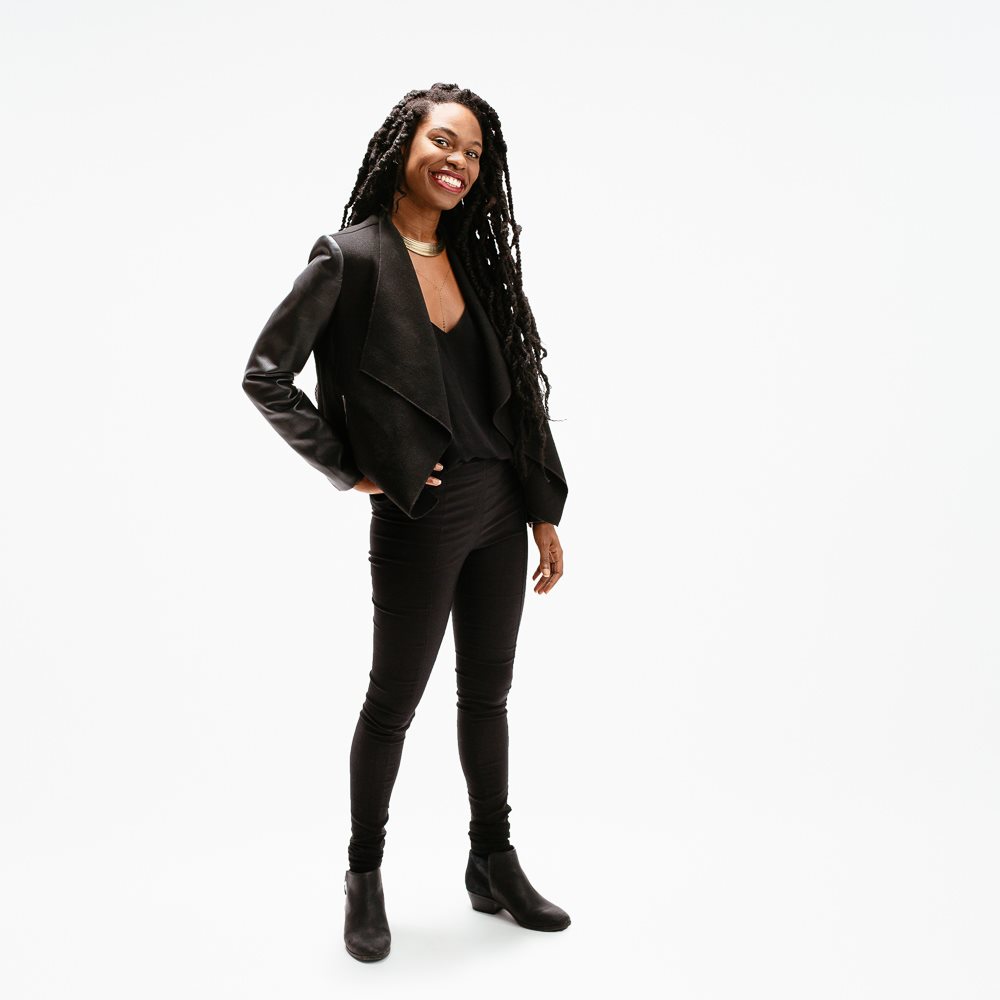Amber Williams-King is a multi-disciplinary Antiguan artist practicing in Toronto. She uses various mediums to explore sexuality, gender, representation and the intersections of identity, while intimately chronicling her experiences as a chronically-ill Black queer femme. Amber has exhibited across the city and has upcoming shows in Montreal and the Caribbean.

Photo of Amber Williams-King by Sean Howard
Your work seeks to challenge notions of a monolithic Black experience; exploring sexuality, gender, race, representation and the intersections of identity. How does your use of mixed media lend itself to this?
Using various materials and practices to create an image or tell a narrative is a response to, and an honouring of, our complex and distinct identities. It's also a way of speaking to parallels and inter-connectivity. This is why collage is so exciting to me, because of the way seemingly disparate and unrelated images or materials can be brought together to create some distorted yet cohesive whole. I appreciate the possibilities that live in the contradictions. I have a series of images that bring together Emancipation-era portraits of women from the Caribbean and contemporary carnival imagery to create these hybrid beings. The juxtapositions in posture, clothing and expression was really intriguing for me as well as the questions of White Gaze and cultural consumption. I also get bored easily and like the idea of learning new skills and figuring out interesting ways to put things together.
Your bio says that you exist through your artistic envisioning. Can you explain this?
For me, it's about representation and self-preservation. The reality is that the voices, experiences and identities of those who are not a part of the dominant culture are often erased and disappeared away. As a Black femme who grapples with suicidal ideation, disability and the medical industrial complex, imagining myself in the future has, at times, been almost impossible. Art offered me the space to name these parts of myself, connect with others, and help build a world that does not thrive on the absolute destruction of me and my people. Faced with the realities of constant dehumanization and genocide, art and Afro-futurism play an important role in the creative self-determination of not only myself but the Black community as a whole.
You created a series of work after your experience camping outside police headquarters as part of the Black Lives Matter protest last year. Can you describe the type of work you created, and what you were responding to?
A lot of that work came out of a need to document what was happening around me, celebrate those at the centre and release this overwhelming influx of emotion. A lot happened in those two weeks. #blackcity was this magnifying glass in the face of anti-Blackness and state violence in this city and a profound expression of Black activism, community, love and solidarity. I would be at Police Headquarters camping out for hours on end with my friends, go home to shower, start crying and then pull out my pencils and watercolours. I sketched things I saw, the faces of protestors and organizers, the police attack, the fire. Some things I shared, some I didn't. The response was so beautiful, I kept going. In a way I think those images were love letters to everyone out there on the front-lines and for those who showed up in all the other necessary ways.
In your opinion, what’s the power of art?
Art, in its many forms, shifts the way we think. It offers us truth and gives us new possibilities.
You grew up in Antigua and moved to Toronto as a young adult. How is your work informed by where you came from, and where you currently live?
Antiguan, and Caribbean culture as a whole, has and will continue to have such a profound impact on me and my work. Caribbean history, aesthetics, spiritualities and thought influence the materials I use, the colours, compositions and the concepts heavily. I spent so much of my childhood with my mother in her garment factory and use printed fabrics and silk screening primarily because of this experience. I grew up going to Mas camps and performing with traditional carnival bands like Vitus, and I love looking for opportunities to incorporate these elements of storytelling and folklore in what I'm doing. I want to contribute new ways of seeing and thinking about the Caribbean diaspora, past and present, through my work. Particularly by exploring issues that are still shrouded by stigma like queer identities and mental illness.
The move to Toronto was hard, I dealt with such a deep depression in the beginning. Being thrown into this new place forced me inside myself. But also expanded my thinking, forced me to see things on a global level - the reach of colonization and anti-Blackness, the expanse of Diaspora, the interconnectivity of our traumas and resilience. A lot of this politicization came via the Caribbean Studies program at University of Toronto and connecting with radical Black, queer and trans community. I was able to explore my identity and sexuality in ways I don't think I would have at home. Access to community arts programs like the AMY Project, Remix and SKETCH helped me find a vehicle for all the things I was feeling and experiencing during such a shifting time in my life. The friendship, love and mentorship I've found here have been life-changing. I think the struggle and ultimate gift of this migration has been connecting to my artistic voice.
What are you working on now?
I recently received a newcomer artist award through the RBC Access Fund, provided by the Neighbourhood Arts Network, to work on a short animated film that seeks to visualize the isolation one can experience with mental and chronic illness through stop-motion and sound.
Learn more: amberwilliamsking.wordpress.com